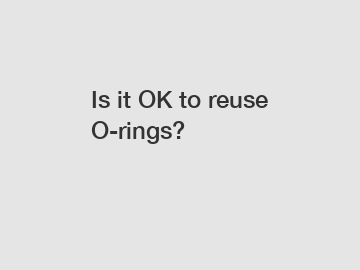Is it OK to reuse O-rings?
Is it OK to Reuse O-rings?
If you are involved in any kind of mechanical industry or frequently deal with machinery, you are probably familiar with O-rings. These round rubber rings serve a crucial role in preventing leakage and maintaining pressure in various applications. Since O-rings are constantly exposed to wear and tear, it is common to wonder whether it is okay to reuse them. In this article, we will explore this question and provide you with some insights to help you make an informed decision.
What are O-rings?

Before delving into the topic, let's briefly discuss what O-rings are. O-rings are circular elastomeric seals that are placed between two parts to prevent leakage of liquids or gases. Typically, these rings are made from materials such as nitrile rubber, silicone, or fluorocarbon. O-rings are often used in hydraulic systems, pumps, valves, and many other mechanical applications.
Understanding the factors affecting O-ring reuse:
When considering whether to reuse O-rings, there are several factors to consider. Here are some key factors that can influence the decision:
1. Condition: The condition of the O-ring plays a crucial role in determining whether it can be reused. Check for signs of damage, such as cuts, abrasions, or swelling. If the O-ring is damaged, it is not safe to reuse, as it may compromise the integrity of the seal.
2. Application: The nature of the application is also an essential factor. If the O-ring is used in a critical application where failure can lead to significant consequences, it is recommended to use a new one. On the other hand, if the application is less critical, and the O-ring is in good condition, it may be possible to reuse it.
3. Compatibility: O-rings are made from various materials, and compatibility with the fluid or gas they come into contact with is vital. Some fluids can degrade or swell certain materials, rendering the O-ring unusable. It is crucial to ensure that the O-ring material is compatible with the application environment.
The advantages and disadvantages of reusing O-rings:
Reusing O-rings can have both advantages and disadvantages. Here are some points to consider:
Advantages of reusing O-rings:
1. Cost-saving: Reusing O-rings can help reduce costs, especially in applications where O-rings need frequent replacement.
2. Environmental impact: By reusing O-rings, you can contribute to reducing waste and environmental pollution.
Disadvantages of reusing O-rings:
1. Increased risk of failure: Reusing O-rings increases the risk of failure, as they may not provide the same level of sealing performance as a new one.
2. Compromised seal integrity: O-rings can deteriorate over time due to exposure to heat, chemicals, or pressure. Reusing a worn O-ring may compromise the integrity of the seal, leading to leakage.
In conclusion, the question of whether it is okay to reuse O-rings depends on various factors such as their condition, application, and compatibility. While reusing O-rings can be cost-effective and environmentally friendly, it is crucial to carefully assess their condition and the risks associated with their reuse. When in doubt, it is always safer to use a new O-ring to ensure optimal sealing performance and prevent potential failures.
If you have any further questions or need assistance with selecting the right O-rings, please feel free to contact us. Our team of experts is always ready to help you find the most suitable solution for your specific applications.
(Contact us at [insert contact information]).
Are you interested in learning more about King Seal, custom rubber diaphragm, Floating Seal Manufacturer? Contact us today to secure an expert consultation!

Comments